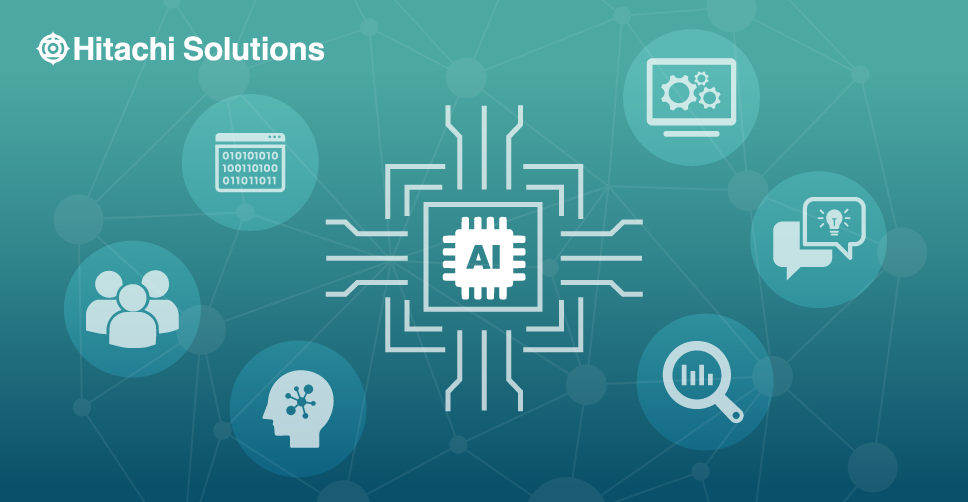

Recently, I sat down with Hitachi Solutions Advisory Vice President Greg Gant to learn more about the conversations he’s been having with generative artificial Intelligence (AI) experts. These conversations include fireside chats with OpenAI’s Sam Altman, as well as ongoing thought leadership connections with various other industry executives. My goal? To harness and share the key takeaways and insights with the listeners of Exchanges, our weekly podcast.
AI and Customer Engagement
While headlines around AI are compelling, they don’t get to the meat of the issue for most executives. This is because, until now, AI has been considered a tool rather than an enabler. However, leveraging AI isn’t just for technologists anymore. It’s becoming an everyday resource — for everyone. So how do we understand, embrace, and plan for that within our organizations? One of our data science experts, Michael Green, put it succinctly in a recent edition of Exchanges focusing on Health and AI when he explained very simply that “AI is search.”
With AI applications from Microsoft and others lifting and augmenting the toolset for literally everyone for free, it’s paramount to establish organizational communication and culture in and around its use. This is the critical juncture where Hitachi Solutions has begun to help executives and enterprises understand how to define AI for themselves, their work culture, and their go-forward principles — and how to best leverage this powerful “search” tool and when it’s appropriate for customer engagement.
The business approach, in this new era, must be addressed for the entire enterprise. This begins by understanding exactly what generative AI is; identifying where in-house capability exists; and determining how, when, and if to leverage it to enhance business performance. That’s the first step.
Thought leadership about this subject is building. There’s a great glossary of terms in a recent article focusing on guidance in and around generative AI for executives published by McKinsey. What we’re trying to do for our customers is build comprehension, as well as provide guidance for establishing “AI culture” within an enterprise.
Charting the Course for Responsible AI
Listen in to Hitachi Solutions Advisory expert Dave Horstein in conversation with VP of Advisory Services Greg Gant, unraveling the essence of AI for enterprises and unlocking its potential as a transformative tool while upholding organizational culture.
Listen to the podcast now!The Tenets of Responsible AI
As a premier partner, Hitachi Solutions strictly adheres to the tenets of Microsoft’s established approach for responsible AI, which are:
- Fairness
- Reliability & Safety
- Privacy & Security
- Inclusiveness
- Transparency
- Accountability
To help customers unpack this, we have developed a Responsible AI Assessment that builds understanding and meets them where they are on their digital journey. The assessment is designed to confirm their approach is modeled after widely accepted and promoted core principles for AI usage, as well as adheres to organizational culture in a way their people will understand and embrace.
According to Gant, who drills down even further with customers one on one, “When we talk about responsible AI, first we are making sure we have a firm understanding of what AI is and what it is not.”
“When we talk about responsible AI, first we are making sure we have a firm understanding of what AI is and what it is not.”
Greg Gant, VP of Advisory Services
He goes on to explain, “Secondly, we communicate and establish guidelines for how to ethically leverage AI so it is safe for operations, employees, and customers — ensuring the approach stays true to the business.”
And thirdly, Gant explains he works with leadership, and throughout each unique enterprise culture, to determine organizationally where the intersection is between humans and automation. This is critical for taking advantage of AI in a way that people can trust. AI doesn’t replace human interaction; it facilitates and augments it.
“We’ve created this OpenAI component. Where does it, and should it, come together with human interaction? How do we plan for that? We want to ensure we are best serving our customers,” said Gant.
Thoughtful Solutioning with Hitachi Solutions
AI is here to stay. So how can we responsibly address what it means for business one customer at a time? As we dive into AI solutioning, what we’re hearing loud and clear from executives is that, perhaps, we need to slow down for a moment. We need to make sure we’re building an ethical and cultural comprehension enterprise-wide of what generative AI is; how it can impact your business; and what foundational skills, standards, and governance we need to lay down throughout the organization as we move forward.
Hitachi Solutions has approached AI from an ethical and responsible position internally in our own practices. This is how we can bring that knowledge and experience to our customers who are looking to explore the value and benefits of AI.
Hitachi Solutions’ Advisory Services team shares a passion for technology, innovation, and customer satisfaction, and has been expertly guiding customers through impactful business change for years. Contact us to hear more from our experts on responsible AI, learn how you can leverage AI for your organization, or chat about how we might help you turn your business strategies into digital realities.


